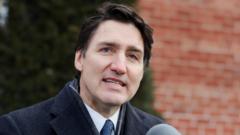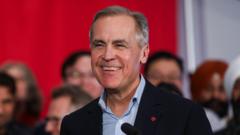In response to President-elect Donald Trump's tariff threats, Prime Minister Trudeau emphasized that there is "not a snowball's chance in hell" that Canada will join the U.S., while also addressing potential economic repercussions and increasing military cooperation.
Trudeau Asserts Canada Won't Be Absorbed by the U.S. Amid Tariff Threats

Trudeau Asserts Canada Won't Be Absorbed by the U.S. Amid Tariff Threats
Canadian Prime Minister Justin Trudeau firmly rejects Donald Trump’s claims that Canada could become the 51st U.S. state due to economic pressures.
In a robust defense of Canadian sovereignty, Prime Minister Justin Trudeau declared there is "not a snowball's chance in hell" that Canada would be absorbed into the United States. This statement comes as President-elect Donald Trump intensified his rhetoric by threatening a hefty 25% tariff on Canadian imports unless Canada took measures to bolster security at the shared border.
During a press conference at his Mar-a-Lago estate, Trump presented a controversial idea of unifying Canada and the U.S. by eliminating the "artificially drawn line," suggesting that such a move would enhance national security. "Canada and the United States, that would really be something," he stated, sparking renewed concerns over the relationship between the two neighboring nations.
The shadow of tariffs looms large over Canada during a politically turbulent time, as Trudeau announced his intention to resign while continuing to serve as prime minister until a new leader is elected by late March. With Canada's parliament suspended until March 24 to facilitate this leadership transition, both Trudeau's government and Canadian economists express concern over the potentially damaging impact of Trump's tariff threats—especially given that nearly C$3.6 billion ($2.5 billion) in goods and services crosses the border each day.
In response, Trudeau's government is contemplating implementing counter-tariffs should Trump proceed with his plans. In a post on X, Trudeau highlighted the mutual benefits that workers and communities in both nations enjoy from being each other's top trading partners.
While Trump acknowledged he is not considering military action to enforce any change, he raised issues regarding Canadian military spending. Despite Canada’s military budget currently sitting at C$27 billion ($19.8 billion, £15.5 billion), the Trudeau administration has committed to nearly doubling that amount to C$50 billion by 2030, facing pressure from both Trump and NATO.
Ontario Premier Doug Ford urged Trudeau to collaborate with provincial leaders to address these trade threats, emphasizing Ontario's substantial trade ties with the U.S.—which totaled over C$493 billion ($350 billion) in 2023. Ford even humorously proposed that if Trump desires Canadian states, they should consider "buying Alaska" along with adding "Minneapolis and Minnesota" into the deal.
Through these developments, the trajectory of Canada's relationship with the U.S. remains uncertain as both sides navigate economic and security challenges in the lead-up to Trump's inauguration.























